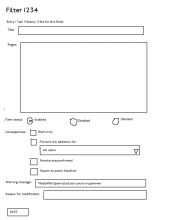There should be a special page to manage the spam blacklist. Admins should be able to check URLs against the blacklist. I had an URL that was blacklisted and I could not find out which regular expression matched it (ok, I could write a simple perl script to to this on my computer). There are some other related suggestions about spam, see:
- T3505: Spam blacklist, if match, check previous version and accept if URL present there
- T3733: Whitelist for spam blacklist
- T4598: only one blacklist file is parsed by SpamBlacklist extension
- T2584: Spam Regex in a Mediawiki page
Maybe you should rewite the entire Spam protection mechanism.
